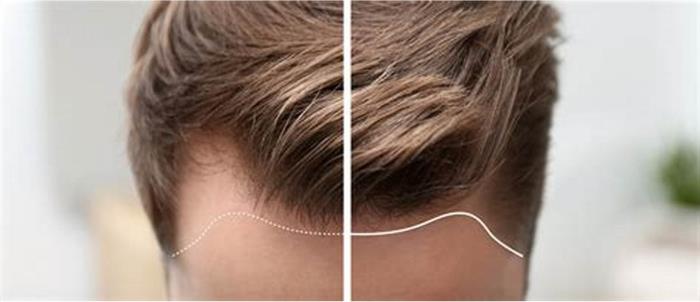Hair loss, or alopecia, can result from a variety of factors and can manifest in several types. The most common cause is genetic predisposition, particularly in androgenetic alopecia, known as male or female pattern baldness. Other causes include hormonal changes, stress, nutritional deficiencies, and medical conditions such as thyroid disorders or autoimmune diseases.
Different types of hair loss include telogen effluvium, characterized by temporary shedding, and alopecia areata, which causes patchy hair loss. Understanding the underlying causes and types of hair loss is essential for determining the most effective treatment options and managing expectations.
Recognizing the Signs of Hair Loss Early
Early recognition of hair loss signs can be crucial for effective intervention. Common early indicators include noticing more hair in your brush or shower drain, a widening part, or a receding hairline. Thinning hair may also be more evident, particularly in the crown area.
If you observe any of these changes, it's important to monitor your hair loss over time. Early detection can lead to prompt action, allowing for better management of the condition and potentially minimizing further loss.
The Importance of Seeking Professional Help
Seeking professional help for hair loss is vital for accurate diagnosis and treatment. A qualified specialist can evaluate the extent of your hair loss, identify underlying causes, and recommend appropriate solutions tailored to your individual needs.
Professional assessments often include a detailed medical history, physical examination, and, if necessary, blood tests or scalp biopsies to determine the specific type of hair loss. This comprehensive approach ensures that you receive the most effective treatment options based on your unique situation.
Assessing Your Hair Loss: When to Consult a Specialist
It’s advisable to consult a hair loss specialist if you notice significant thinning, rapid hair loss, or if hair loss runs in your family. Additional factors include changes in hair texture, patches of baldness, or if hair loss is affecting your self-esteem and quality of life.

If over-the-counter products and lifestyle changes do not yield improvement, seeking a professional opinion can help identify any underlying medical conditions and open the door to more effective treatment options, including prescription medications or advanced therapies.
Non-Surgical Options for Managing Hair Loss
Non-surgical options for managing hair loss are becoming increasingly popular and effective. Treatments such as minoxidil (Rogaine) and finasteride (Propecia) can help stimulate hair growth and slow the progression of hair loss in both men and women.

Additionally, therapies like platelet-rich plasma (PRP) injections promote healing and stimulate hair follicles, while laser therapy can improve scalp circulation. Lifestyle changes, including a balanced diet rich in vitamins and minerals, stress management, and proper hair care, also play a crucial role in maintaining hair health and preventing further loss.
Over-the-Counter Treatments: What Works?
Over-the-counter treatments for hair loss often include topical solutions and shampoos formulated with ingredients such as minoxidil, ketoconazole, and saw palmetto. Minoxidil, available in both liquid and foam forms, is the most widely used OTC treatment, known for stimulating hair growth and slowing down hair loss. Other products, like ketoconazole shampoo, may help reduce scalp inflammation and combat dandruff, which can contribute to hair thinning. While some individuals may see positive results with these treatments, it's essential to remember that effectiveness varies, and ongoing use is typically required to maintain results.
Prescription Medications: Minoxidil vs. Finasteride
When considering prescription medications for hair loss, minoxidil and finasteride are the two primary options. Minoxidil, although also available over the counter, is often prescribed in higher concentrations for individuals experiencing more significant hair loss. It works by increasing blood flow to hair follicles. Finasteride, on the other hand, is a prescription oral medication that inhibits the hormone responsible for hair loss, making it particularly effective for men. While both medications can yield positive results, they may have different side effects, and a healthcare provider should guide their use.

The Role of Hair Growth Supplements
Hair growth supplements can play a supportive role in promoting hair health, particularly when they contain ingredients known to encourage hair growth, such as biotin, vitamin D, zinc, and omega-3 fatty acids. These supplements may help fill nutritional gaps and enhance the overall health of hair follicles. However, it’s important to note that while supplements can contribute to hair health, they should not be viewed as standalone treatments for hair loss. Consulting a healthcare professional before starting any supplementation is advisable to ensure it complements existing treatment plans effectively.
Lifestyle Changes to Support Hair Health
Implementing lifestyle changes can significantly support hair health and minimize hair loss. A balanced diet rich in vitamins and minerals, particularly those that promote hair growth, such as biotin and iron, is essential. Staying hydrated and managing stress through regular exercise, mindfulness practices, and adequate sleep also play crucial roles in maintaining healthy hair. Avoiding smoking and limiting alcohol consumption can further enhance overall well-being and support hair health. Making these changes can create a more favorable environment for hair growth and contribute to better outcomes in hair restoration efforts.

Hair Care Tips for Thinning Hair
For individuals experiencing thinning hair, adopting a gentle hair care routine is vital. This includes using sulfate-free shampoos that do not strip natural oils from the scalp and hair. Avoiding excessive heat styling and harsh chemical treatments can help prevent further damage. Regularly massaging the scalp can stimulate blood circulation, encouraging hair growth. Additionally, using lightweight, volumizing products can give the appearance of thicker hair without weighing it down. It’s also beneficial to limit tight hairstyles that pull on the hair, as this can lead to breakage and exacerbate thinning.
Exploring Scalp Micropigmentation as a Temporary Solution
Scalp micropigmentation (SMP) is a non-surgical cosmetic procedure that involves tattooing tiny dots on the scalp to mimic the appearance of hair follicles. This technique can effectively create the illusion of a fuller head of hair for individuals with thinning hair or bald spots. SMP is particularly appealing because it requires minimal maintenance and provides immediate results. While it does not address the underlying causes of hair loss, it can be a valuable temporary solution for those seeking to boost their confidence and enhance their appearance while exploring other treatment options.
Understanding the Limitations of Home Remedies
While many individuals turn to home remedies for hair loss, it's important to understand their limitations. Common home remedies, such as essential oils, aloe vera, and herbal rinses, may provide some benefits for scalp health and hair condition but are unlikely to produce significant regrowth on their own. Additionally, results can be inconsistent, and the scientific evidence supporting the efficacy of many home remedies is often limited. For those experiencing substantial hair loss, it is advisable to seek professional guidance and consider proven treatments to achieve the best outcomes.
Psychological Impact of Hair Loss: Coping Strategies
Hair loss can have a profound psychological impact, affecting self-esteem and body image. Individuals may experience feelings of embarrassment, anxiety, or depression as they navigate changes in their appearance. Coping strategies can include seeking support from friends and family, joining support groups, or talking to a mental health professional who specializes in body image issues. Engaging in activities that boost confidence, such as pursuing hobbies or improving personal style, can also help alleviate the emotional burden of hair loss. Recognizing and addressing these psychological effects is an important part of the overall hair restoration journey.
Preparing for a Hair Transplant Consultation
Preparing for a hair transplant consultation involves gathering essential information and setting realistic expectations. Patients should document their hair loss history, including any previous treatments, and compile a list of questions to ask the specialist. It may also be helpful to bring photos illustrating the desired results and areas of concern. Understanding the different types of hair transplant techniques and potential outcomes can also facilitate productive discussions with the surgeon. Being well-prepared helps ensure that all concerns are addressed and aids in making informed decisions about treatment options.
Questions to Ask Your Hair Specialist
When consulting with a hair specialist, asking the right questions can provide valuable insights into the treatment process. Some important questions include:
- What is the recommended treatment plan for my specific type of hair loss?
- What are the potential risks and side effects of the proposed procedures?
- How long can I expect the results to last, and what maintenance will be required?
- Can you show me before-and-after photos of previous patients?
- What are the costs associated with the recommended treatments, including any follow-up care?
Setting Realistic Expectations for Hair Restoration
Setting realistic expectations for hair restoration is crucial for a successful outcome and patient satisfaction. While various treatments can significantly improve hair density and overall appearance, it’s essential to understand that results vary from person to person and depend on the extent of hair loss, the chosen treatment method, and individual response to therapy. For instance, non-surgical options may yield gradual results, while surgical procedures can offer more immediate changes. Patients should have open discussions with their hair specialists about expected timelines, possible outcomes, and the need for ongoing maintenance to align their goals with achievable results.
Importance of a Comprehensive Treatment Plan
A comprehensive treatment plan is vital for addressing hair loss effectively and holistically. This plan should include an assessment of the underlying causes of hair loss, the selection of appropriate treatments—whether surgical, non-surgical, or a combination of both—and regular follow-ups to monitor progress. By incorporating lifestyle modifications, dietary changes, and supplementary therapies, patients can enhance the effectiveness of their primary treatment. A tailored plan developed in collaboration with a healthcare provider ensures that all aspects of hair health are considered, increasing the chances of successful and sustainable results.
How to Track Your Hair Loss Progress
Tracking hair loss progress is essential for evaluating the effectiveness of treatments and making informed decisions. Patients can document their hair condition through regular photos taken from consistent angles and lighting. Keeping a journal to note changes in hair thickness, shedding patterns, and the response to treatments can also be beneficial. Additionally, maintaining communication with a hair specialist for periodic assessments allows for timely adjustments to the treatment plan. By actively monitoring progress, individuals can gain insights into what is working and when it might be necessary to explore alternative options.
Understanding the Costs of Hair Restoration Options
The costs associated with hair restoration options can vary widely depending on the chosen treatment method, the extent of hair loss, and geographic location. Non-surgical treatments, such as topical solutions and supplements, generally require ongoing expenses but may have lower initial costs. Surgical options like hair transplants typically involve higher upfront costs but can provide long-term results. It’s crucial for patients to consider not only the initial costs but also any potential follow-up treatments, maintenance, or additional therapies that may be required over time. Discussing financial expectations upfront with the hair restoration specialist can help in planning for the overall investment in hair health.
Conclusion: Taking Control of Your Hair Loss Journey
Taking control of your hair loss journey involves understanding the available treatment options, setting realistic expectations, and committing to a comprehensive plan tailored to your needs. By actively participating in the decision-making process, tracking progress, and making informed choices regarding treatments and lifestyle changes, individuals can significantly enhance their chances of achieving desired results. Furthermore, recognizing the emotional and psychological aspects of hair loss and addressing them through support and coping strategies can empower patients on their journey to hair restoration. Ultimately, proactive engagement and informed decisions are key to restoring confidence and enhancing overall quality of life.
How to Maintain Your Hair After a Transplant
Discover essential tips on maintaining your hair after a transplant to ensure the best results. This includes post-operative care, recommended hair products, and lifestyle practices that promote healthy hair growth. Proper maintenance is key to achieving long-lasting and natural-looking results from your procedure.
Latest Advancements in Hair Restoration Technology
Stay updated on the latest advancements in hair restoration technology, including cutting-edge techniques and tools that improve the efficiency and outcomes of hair transplant procedures. This section highlights innovations such as robotic-assisted transplants, advanced follicular unit extraction methods, and new research in hair growth stimulants.
Best Hair Transplant Surgery in India
The Best Hair Transplant Surgery in India provides patients with effective solutions for hair loss, utilizing advanced techniques to achieve natural-looking results and boost self-esteem.
Best Hair Transplant Hospitals in India
The Best Hair Transplant Hospitals in India are equipped with cutting-edge technology and experienced teams, offering comprehensive care from initial consultations to post-surgery follow-ups for optimal recovery.
Hair Transplant Surgery Cost in India
The Hair Transplant Surgery Cost in India is affordable, ensuring transparency and value while delivering high-quality treatment in top-tier facilities.
Best Hair Transplant Surgeons in India
The Best Hair Transplant Surgeons in India have extensive expertise in hair restoration techniques, providing personalized care to achieve the best results tailored to each patient's unique needs.
FAQ
What are the most common causes of hair loss?
The most common causes of hair loss include genetic predisposition (androgenetic alopecia), hormonal changes, medical conditions (such as thyroid disorders and autoimmune diseases), nutritional deficiencies, stress, and certain medications.
How effective are non-surgical treatments for hair loss?
Non-surgical treatments, such as minoxidil and PRP therapy, can be effective for many individuals, particularly in the early stages of hair loss. However, their effectiveness varies, and they may not work for everyone. Consistency and long-term use are often required to see noticeable results.
Can lifestyle changes really make a difference in hair health?
Yes, lifestyle changes can significantly impact hair health. A balanced diet rich in essential nutrients, regular exercise, stress management, and adequate sleep can all contribute to healthier hair. Avoiding harmful practices, such as smoking and excessive heat styling, can also promote hair vitality.
When is the right time to consider a hair transplant?
The right time to consider a hair transplant varies by individual but generally includes scenarios of significant hair loss that has stabilized, non-surgical treatments have been ineffective, and the individual is committed to long-term maintenance. Consulting with a hair restoration specialist can provide personalized guidance.
What should I expect during my consultation for a hair transplant?
During a hair transplant consultation, expect a thorough assessment of your hair loss pattern, discussion of your medical history, and an evaluation of potential treatment options. The specialist will explain the procedure, recovery process, expected outcomes, and associated costs. It’s also an opportunity to ask questions and address any concerns you may have.